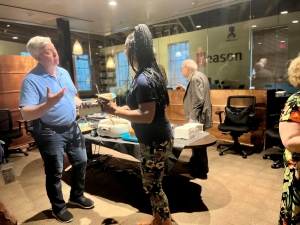Supply Chain Turmoil and Congestion
By Sophie Guiny and Katie Kraft, WTS-DC
August 2022
On August 10, members and friends of WTS-DC, the Transportation Research Forum (TRF-DC), and Young Professionals in Transportation (YPT-DC) gathered together at the Reason Foundation for the 13th annual WTS-TRF-YPT summer event. Three speakers shared their thoughts on the timely topic of supply chain disruptions: Dorothy Robyn, public policy consultant; Andrew Petrisin, Supply Chain Advisor at the U.S. Department of Transportation; and moderator Professor Thomas Corsi, Academic Director, MS Supply Chain Program and Michelle L. Smith Professor of Logistics at the Robert H. Smith School of Business, University of Maryland.

Dorothy Robyn highlighted the impacts of the motor carrier and freight rail industries’ deregulation in the 1980s, which were both successful, as the increased competition provided incentives for innovation and led to lower shipping rates.
Andrew Petrisin noted that USDOT has limited power over a siloed, privately-operated supply chain. The main role that USDOT has been able to play is that of convener, encouraging information sharing through regular calls between ports, shipping companies, and freight railroads. This has helped facilitate the flow of cargo from ports.

Panelists noted that companies had gotten carried away with “just in time” logistics and stretched the supply chain by expanding the number of suppliers. They had largely ignored the risk of failure, which materialized in the wake of the COVID pandemic, when demand increased as supply contracted for key components like semiconductors.

The lesson learned is that companies will have to adapt to supply chain risk, while the federal government should focus on the national security implications of supply chain issues, rather than re-regulation. While the high shipping rates contributed to the overall inflation (and record profits for shipping lines), spot rates are beginning to decline.
Panelists also noted that the disruption at US ports was likely exacerbated by the fact that they have invested less in automation and are less efficient than their European and Asian counterparts, largely due to labor issues. There was a lively Q&A session, which continued after the official end of the event, as speakers and attendees discussed potential policy outcomes and industry responses to supply chain issues.
WTS-DC thanks TRF-DC and YPT-DC for their continued collaboration on this annual joint event, the Reason Foundation for donating the event venue, and Ms. Robyn, Mr. Petrisin, and Professor Corsi for sharing their time and knowledge with our attendees.